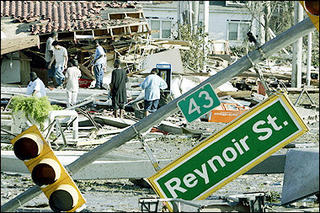
Septembe 1st, 2005 - Like millions around the world, I've been glued to my tv set the past couple of days, shocked by the images showing the aftermath of Hurricane Katrina in Southern USA.
Scenes of bodies lying on the streets, people pushing shopping carts filled with their belongings along highways, children crying and pleading for help, looters breaking into stores - these are images that I often associate Third World, war-torn countries with - and most definitely not an American City - especially New Orleans, with its unique French Quarter and historic Garden District, and those wild Mardi-Gras parties.
Katrina however uncovered a hidden side of New Orleans (and perhaps most American cities) that most of us forget and ignore. While the reporters covering the disaster did not point this out on the air, the camera held nothing back. Most of those who stayed behind after the mandatory evacuation of New Orleans were poor and black. As were most of the looters.
In a city where the poverty rate is double the national's average, where over half of the city is African-American, whatever disaster plan that the city had simply failed to address the needs of this underclass. Lacking money, education, and the means to get out of the city, they became the tragic victims in this disaster. The result of course are the heartbreaking images of people struggling to survive inside the Superdome and the Convention Centre - reminiscent of Third World refugee camps.
And can we blame the people for looting ? Sure enough, there were many who took advantages of the tragedy for personal gains; many however, simply broke into stores because they had no other choice: their instinct was to survive and if that means breaking into a store to get some food and water, then so be it.
The hurricane revealed deep segregation continues to exist in American cities. The poor continues to suffer disapportionately. While it is true that the storm did not discriminate, the system however, put poor African Americans at greater risk than other groups, and thus make them more vulnerable to the disaster.
There is no doubt that New Orleans will be rebuilt, but what will happen to the poor people living in the most flood-prone sections of the city ? Will the "new" New Orleans have a place for them ? is this an opportunity for things to change ? or will the poor become invisible again, until perhaps the next disaster ?

No comments:
Post a Comment